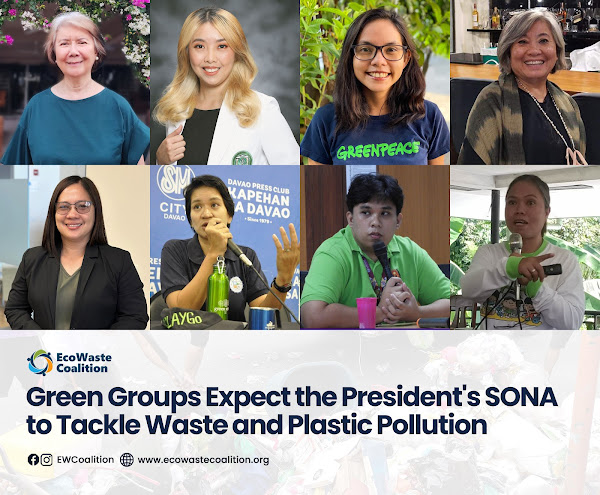Green Groups Expect the President's SONA to Tackle Waste & Plastic Pollution

To address the situation, she called on 1) educational, science, and technology sectors to share the truth about single use plastic; 2) manufacturers and consumers to invest in quality goods that are safe to use and last long; and 3) policy makers to create an enabling environment that will encourage people to choose only what is safe and sustainable and not what is only convenient, stressing “convenience at the expense of health is a self-imposed impediment.”
Zero waste champion Sonia Mendoza, Chairman of the Mother Earth Foundation (MEF) called on the government to “ensure stricter implementation of Republic Act 9003, or the Ecological Solid Waste Management Act, to invest in reuse and refill systems and to divest from waste-to-energy (WtE) incineration technologies.”
“Greenpeace is calling on President Marcos to act on the plastic pollution by urgently reducing plastic production and use in the country. The president must introduce measures to prevent harmful impacts on Filipinos affected by plastic from production to wastage by reducing plastic production and curbing corporate dependence on single-use plastics,” said Marian Ledesma, Zero Waste Campaigner, Greenpeace Philippines. “Moreover, the government must support ambitious provisions in the Global Plastics Treaty to reduce overall plastic production and ensure a democratic voting mechanism for decision-making among member states.”
“Plastic pollution has become one of the most pressing environmental threats impacting people's health and the environment,” noted Chinkie Peliño-Golle, Regional Coordinator, International Pollutants Elimination Network – Southeast and East Asia (IPEN-SEA). “We urge the President to mandate the putting up of safe and sustainable measures to address plastic pollution in the country. Additionally, the Philippines should take a strong stance and actively take part in the Global Plastics Treaty negotiations and ensure that the Treaty should end the production and use of toxic chemicals in plastics, remove toxic impacts at all stages of the lifecycle of plastics, and protect the public’s right to know about chemicals in plastics and information on plastic production and waste exports.”
“We at Health Care Without Harm Southeast Asia (HCWH- SEA) urge the government to pay attention and take action in addressing medical plastic waste pollution,” said Dr. Michelle Reyes, Healthcare Waste Sustainability Officer, HCWH-SEA. “We call upon all healthcare waste facilities and institutions to ban all unnecessary plastic by reducing and progressively eliminating plastics significantly.”
According to HCWH, healthcare facilities should also demand transparency about the chemical composition of plastics and ensure labeling on polymers and their additives is a requirement. Furthermore, the health sector should also ban false solutions to plastic pollution, including chemical recycling and waste to energy to process plastic waste. It is high time that the health sector also becomes part of the solution because we have seen a significant contribution to the increase in the plastics generated due to the COVID-19 pandemic and beyond, the group pointed out.
“One of our advocacies for the environment is to reduce the use of single-use plastics. With that, we would like the President to commit to banning single-use plastics in the country. It may be a challenging task for a country like ours to adopt, but it's not impossible. We should invest in our future and for future generations,” said Caile Dayrit of the Student’s Environmental Alliance of Davao.
Carmela Marie Santos of Ecoteno has this to say: “The President must recognize that the environment and economy go hand in hand. The push for a charter change will only make matters worse for our environment and people. As it is, the Philippines is being parceled into by multinational companies – if not mining, corporate agriculture and build, build, build -- which puts our critical watersheds and other protected areas in direct danger.”





Comments